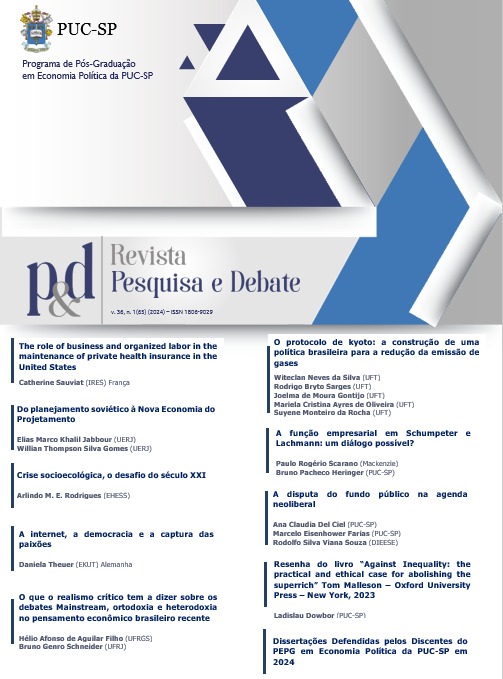The dispute over public funds in the neoliberal agenda
DOI:
https://doi.org/10.23925/1806-9029.36i1(65)67291Keywords:
Social Security., Public Spending Limited, Public Fund, Minimum wageAbstract
This article seeks to carry out a brief reflection on the dispute over the federal public budget that deepens from 2017 onwards, with the approval of the Constitutional Amendment (EC) 95/2016 known as the to the Public Spending Limited - EC 95/2016, that establishes the new fiscal regime, limiting the Fiscal and Social Security Budget of the Union for twenty years. This is a bibliographic and documentary research, where, initially, there is a debate on the analysis of the dominance of financial capital in Brazil based on recent literature. Some of the main characteristics of federal public spending are presented, submitted to financial logic in a critical approach to the fiscal adjustment policy, resulting in restrictions on public policy budgets. Next, a brief table is presented, with some historical data of the federal government's public accounts from 2003 to 2022. The fifth point addressed refers to the evolution of the minimum wage in the same period, as this is a of the fundamental components of financing the Social Security Budget. The study also highlights the important role of the minimum wage policy, which contributes significantly to the stabilization and financing of Social Security, as well as a preliminary assessment of the so-called the Public Spending Limited and its role in the dispute over the Public Budget and a brief analysis of the its reflection in the deterioration of the living conditions of the Brazilian population.
References
MARQUES, Rosa Maria; ANDRADE, Patrick Rodrigues. Democracia burguesa e dominância do capital portador de juros: apontamentos sobre processos em curso no Brasil. Disponível em: http://oolhodahistoria.ufba.br/wp-content/uploads/2016/12/rosamaria-1.pdf. Acesso em: 5 jun. 2022.
MARQUES, Rosa Maria; ANDRADE, Patrick Rodrigues. Marx e o capitalismo do século XXI. Revista de Economia Política. Vol. 40. N° 4, pp.766-787, outubro-dezembro 2020.
BRASIL. Constituição (1988). Constituição da República Federativa do Brasil de 1988. Brasília, DF: Presidência da República. Disponível em: https://www.senado.leg.br/atividade/const/con1988/CON1988_05.10.1988/art_3_.asp. Acesso em: 11 mar. 2020.
BRASIL. Senado Federal. Proposta de Emenda à Constituição nº 95 de 2016. Altera o Ato das Disposições Constitucionais Transitórias, para instituir o Novo Regime Fiscal, e dá outras providências. Brasília, DF: Senado Federal, 2016. Disponível em: http://www.planalto.gov.br/ccivil_03/constituicao/emendas/emc/emc95.htm. Acesso em: 17 maio 2021.
BRASIL. Controladoria Geral da União. Portal da Transparência, 2023. Disponível em: http://www.portaltransparencia.gov.br/funcoes/08-assistencia-social?ano=. Acesso em: 05 abr. 2023.
CÂMARA DOS DEPUTADOS. EMENDA CONSTITUCIONAL 126/22 – PEC da TRANSIÇÃO. Disponível em: https://www.camara.leg.br/proposicoesWeb/prop_mostrarintegra?codteor=2229383&filename=REDACAO%20FINAL%20PEC%2032/2022%20(Fase%201%20-%20CD) Acesso em 13 abr. 2023.
CARCANHOLO, Reinaldo. A. NAKATANI, Paulo. O capital especulativo parasitário: uma precisão teórica sobre o capital financeiro, característico da globalização. Ensaios FEE. Porto Alegre, v20, n1, p284-304, 1999.
CARVALHO, Laura; ROSSI, Pedro. Mitos fiscais, dívida pública e tamanho do Estado. In: DEWECK, Esther; OLIVEIRA, Ana Luíza Matos; ROSSI, Pedro. Economia pós-pandemia: Desmontando os mitos da austeridade fiscal e constituindo um novo paradigma econômico no Brasil. São Paulo: Autonomia Literária, 2020. Disponível em: https://pedrorossi.org/wp-content/uploads/2020/11/Economia-Po%CC%81s-Pandemia-compactado.pdf. Acesso em: 08 abr. 2021.
CHESNAIS, François. Introdução Geral. In CHESNAIS, F. (org.). A mundialização financeira: gênese, custos e riscos. São Paulo: Xamã. 1998.
CHESNAIS, François. O capital portador de juros: acumulação, internacionalização, efeitos econômicos e políticos. In CHESNAIS, F. (org.) A finança mundializada: raízes sociais e políticas, configuração, consequências. São Paulo: Boitempo. 2005.p.35-46.
CIEL, Ana Claudia Del. O Programa Bolsa Família e a Desigualdade Social no Brasil: o efeito multiplicador do programa na renda familiar, no consumo e nas economias locais, 183pp. Dissertação (Mestrado em Serviço Social) Pontifícia Universidade Católica de São Paulo, São Paulo, 2021.
DEWECK, Esther. Por que é imprescindível revogar o Teto de Gastos? In: DEWECK, Esther; OLIVEIRA, Ana Luíza Matos; ROSSI, Pedro. Economia pós-pandemia: Desmontando os mitos da austeridade fiscal e constituindo um novo paradigma econômico no Brasil. São Paulo: Autonomia Literária, 2020. Disponível em: https://pedrorossi.org/wp-content/uploads/2020/11/Economia-Po%CC%81s-Pandemia-compactado.pdf. Acesso em: 08 abr. 2021.
DIEESE. Departamento Intersindical de Estatística e Estudos Socioeconômicos. Nota Técnica, n. 201, 2019. Disponível em: https://www.dieese.org.br/notatecnica/2019/notaTec201SalarioMinimo.pdf. Acesso em: 15 mar.2023.
DOWBOR, Ladislau. A Era do Capital Improdutivo. São Paulo: Autonomia Literária, 2017. p.17-38,187-276. Disponível em: https://dowbor.org/wp-content/uploads/2012/06/a_era_do_capital_improdutivo_2_impress%C3%A3oV2.pdf. Acesso em: 15 ago. 2022.
FAGNANI, Eduardo. Reforma tributária para enfrentar a desigualdade social. In: CASTRO, Jorge Abrahão; POCHMANN, Marcio (Org.). Brasil: Estado social contra a barbárie. São Paulo: Fundação Perseu Abramo, 2020. p.335-366. Disponível em: https://fpabramo.org.br/publicacoes/wp-content/uploads/sites/5/2020/07/Brasil-Estado-Social-contra-a-Barb%C3%A1rie-Capa.pdf. Acesso em: 3 out. 2022.
IBGE. Instituto Brasileiro de Geografia e Estatística. Síntese de Indicadores Sociais, 2020. Uma análise da condição de vida da população brasileira. Disponível em: https://biblioteca.ibge.gov.br/visualizacao/livros/liv101760.pdf. Acesso em: 12 jan. 2021.
INSTITUIÇÃO FISCAL INDEPENDENTE. SENADO FEDERAL. Relatório de Acompanhamento Fiscal nr.º 70, p. 33-35, nov. 2022. Disponível em : https://www2.senado.leg.br/bdsf/bitstream/handle/id/602493/RAF70_NOV2022.pdf. Acesso em 13 abr. 2023.
LAPY, Ilan. François Chesnais. Finance capital today: corporations and banks in the lasting global slump. Boston. Revista Tempo Social, São Paulo, v. 30, n. 2, p.331, maio/ago. 2018. Disponível em:< https://www.scielo.br/j/ts/a/dRjp6wWrbMCWwYfBMLxHHBC/?lang=pt&format=pdf >. Acesso em: 03/07/2023.
MARQUES, Rosa Maria. O Capitalismo financeiro e as políticas sociais: a nova face da contemporaneidade. In: RAICHELIS, R; VICENTE, D; ALBURQUEQUE, V. (org.) A Nova morfologia do trabalho no Serviço Social. São Paulo: Cortez, 2018.p.108-125.
MARX, Karl. O capital: crítica da economia política. 27. ed. Rio de Janeiro: civilização Brasileira, 2010. Livro I.
MINISTÉRIO DO DESENVOLVIMENTO SOCIAL. Orçamento da Assistência Social, 2018. Disponível em: http://www.mds.gov.br/cnas/noticias/orcamento-da-assistencia-social-sofre-cortes. Acesso em: 12 abr. 2021.
SALVADOR, Evilásio da Silva. Fundo Público no Brasil: Financiamento e destino dos recursos da seguridade social (2000 a 2007), 395pp. Tese (Doutorado em Política Social) Universidade de Brasília, Brasília, 2008.
SALVADOR, Evilásio da Silva. O desmonte do financiamento da seguridade social em contexto de ajuste fiscal. Revista Serviço Social & Sociedade, São Paulo, n. 130, p. 426-446,set./dez.2017. Disponível em: https://www.scielo.br/j/sssoc/a/mT566rdLKQ8crx5qQ4z7W9k/?format=pdf&lang=pt. Acesso em: 12 jun. 2023.
SALVADOR, Evilásio. Fundo Público e Políticas Sociais na crise do capitalismo. Serv. Soc. Soc., São Paulo, n. 104, p. 605-631, out./dez. 2010. Disponível em: https://edisciplinas.usp.br/pluginfile.php/5135894/mod_resource/content/1/Fundo%20p%C3%BAblico%20e%20pol%C3%ADticas%20sociais%20na%20crise%20do%20capitalismo.pdf. Acesso em: 18 out. 2021.
Downloads
Published
How to Cite
Issue
Section
License
Copyright (c) 2024 Research & Debate Journal of the Postgraduate Program in Political Economy

This work is licensed under a Creative Commons Attribution 4.0 International License.


